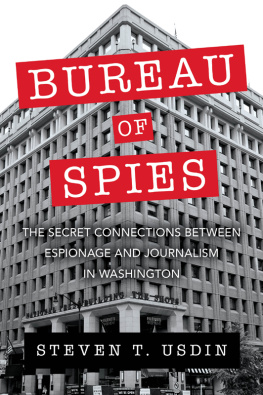Routledge Revivals
Plots and Paranoia
Britains secret state exists to protect her from enemies within. It has always aroused controversy; on the one hand it is credited with preventing wars, revolutions and terrorism and on the other it is accused of subverting democratically elected governments and luring innocents to death. What is the true story? The book, first published in 1989, delves beneath the myths and deceptions surrounding the secret service to reveal the true nature and significance of covert political policing in Britain, from the spies and bloodites of the eighteenth century to todays MI5. This title will be of interest to students of modern history and politics.
Plots and Paranoia
A History of Political Espionage in Britain 1790-1988
Bernard Porter
First published in 1989
by Unwin Hyman Ltd
This edition first published in 2016 by Routledge
2 Park Square, Milton Park, Abingdon, Oxon, OX14 4RN
and by Routledge
711 Third Avenue, New York, NY 10017
Routledge is an imprint of the Taylor & Francis Group, an informa business
1989, 1992 Bernard Porter
The right of Bernard Porter to be identified as author of this work has been asserted by him in accordance with sections 77 and 78 of the Copyright, Designs and Patents Act 1988.
All rights reserved. No part of this book may be reprinted or reproduced or utilised in any form or by any electronic, mechanical, or other means, now known or hereafter invented, including photocopying and recording, or in any information storage or retrieval system, without permission in writing from the publishers.
Publishers Note
The publisher has gone to great lengths to ensure the quality of this reprint but points out that some imperfections in the original copies may be apparent.
Disclaimer
The publisher has made every effort to trace copyright holders and welcomes correspondence from those they have been unable to contact.
A Library of Congress record exists under LC control number: 89034953
ISBN 13: 978-1-138-95443-4 (hbk)
ISBN 13: 978-1-315-66685-3 (ebk)
PLOTS AND PARANOIA
A history of political espionage in Britain 17901988
Bernard Porter
Bernard Porter, 1989, 1992
This book is copyright under the Berne Convention. No
reproduction without permission. All rights reserved.
First published in 1989 by Unwin Hyman Ltd
First published in paperback in 1992 by
Routledge
11 New Fetter Lane, London EC4P 4EE
Simultaneously published in the USA and Canada by
Routledge
a division of Routledge, Chapman and Hall, Inc.
29 West 35th Street, New York, NY 10001
British Library Cataloguing in Publication Data
Porter, Bernard
Plots and paranoia: a history of political espionage in Britain, 17901988.
1. Great Britain. Politics, Role, history of espionage
I. Title
320.941
ISBN 0 415 07900 4
Library of Congress Cataloging-in-Publication Data
Porter, Bernard.
Plots and paranoia: a history of political espionage in Britain, 17901988 / Bernard Porter.
p. cm.
Bibliography: p.
Includes index.
ISBN 0 415 07900 4
1. PoliceGreat BritainPolitical activityHistory
2. Political crimes and offensesGreat BritainHistory
3. Intelligence servicePolitical aspectsGreat BritainHistory
4. Secret servicePolitical aspectsGreat BritainHistory
I. Title
HV8195.A3P67 1989 | 8934953 |
364.131dc20 | CIP |
Typeset in 10 on 12 point garamond and printed in Great Britain by The University Press, Cambridge
Contents
For Deirdre,
Zo, Ben and Kate
Domestic espionage is the hidden underside of political history. It may be immensely important. It is possible that without it we would be a very different country from what we are today. We might have a different religion, a different queen, or a different political system. We might be a satellite of a French or German or Russian empire. We could even have a Labour government. All these happy escapes have been credited to Britains security services at one time or another. Yet historians who are supposed to tell why things have happened in history have had almost nothing to say about this side of it at all.
Non-historians have noticed this. Secret services, claims Ladislas Farago, a novelist, have exerted far greater influence on history than on the historians. In his opinion, Behind every great event, and behind the statesmen who shaped them, stood the spies. This is clearly not good enough, for a profession that has been trained to think that big events must have rather bigger causes than this.
The other main reason for neglect, of course, is the problem of evidence. There are two difficulties here. The first is that there is not enough of it. In many cases there probably never was enough of it, simply because secret agencies do not always write things down. In other instances it has been destroyed, possibly in order to hide things; or is still kept locked away. This applies to most twentieth-century material on MI5 and the Special Branch, which makes the historians job a particularly frustrating one. The stuff is there, but he cannot get at it. So he cannot come to informed judgements; only guesses, which can be overturned. That is a strong temptation to ignore this area entirely, and concentrate on what seem at any rate to be the much more open faces of history.
The other difficulty compounds this one, but also eases it in a way. The fact is that all evidence in this area is undependable. That means that even if we were able to see the official record, it might not help. It also means that we cannot rely on the evidence we are able to see. The reason for this is that all spies and secret agents are liars, trained in techniques of deception and dissimulation, who are just as likely to fake the historical record as anything else. This is why the first rule for the reader of any book about secret services, including this one, is not to trust a word of it. It could all be lies and disinformation; not on the part of the writer necessarily, but on the part of the sources he is gullible enough to believe. That is another deterrent to historians who might be tempted to venture into this area. No one likes to risk being taken for a ride.
But what if it is important? What if our present state of national good health (or whatever) really can be attributed to the work of our security services? We may not want to believe in the treatment, or trust the doctors administering it; but we cannot ignore entirely the possibility that it could have worked. Besides, if we do we might miss some other significant things. Treatments have side-effects. Sometimes they turn out to be more drastic than the original diseases. That has been true of domestic espionage in Britain at certain times. Secondly, treatments can tell us a great deal about the doctors who prescribe them, and the assumptions and general ethoses of their times. That is also manifestly true in this case. Even if the history of British counter-intelligence were not important in a practical, causal sense and it may have been that too it is certainly highly revealing about the societies and polities that relied on it, or did not, as the case might be.














